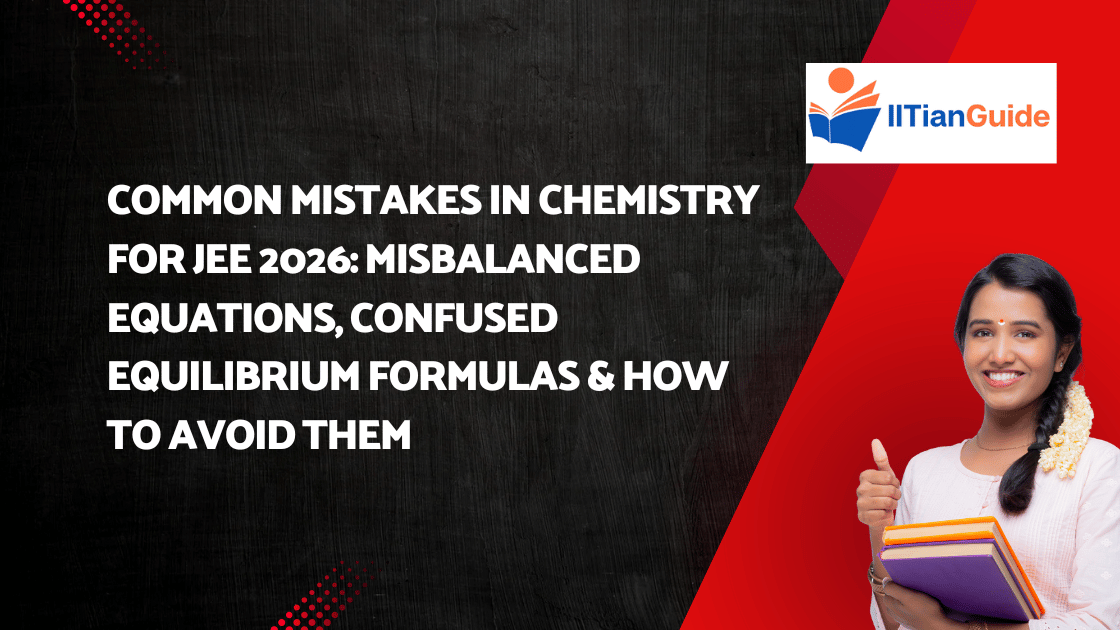Common Mistakes in Chemistry for JEE 2026: Misbalanced Equations, Confused Equilibrium Formulas & How to Avoid Them

Even strong JEE aspirants make small yet costly mistakes in Chemistry. Whether it’s misbalancing chemical equations, confusing equilibrium expressions, or using the wrong units, these errors often come from careless habits, not lack of knowledge.
This blog lists the most common mistakes in Chemistry, explains why they happen, and gives practical tips to avoid them. Mastering these will help you improve your accuracy, save time, and boost your JEE score.
1. Misbalancing Chemical Equations
The Mistake:
Many students either forget to balance the chemical equation or misbalance it by adjusting the wrong element or molecule.
Why It Matters:
An unbalanced equation leads to incorrect mole ratios, which affects the entire problem. This is especially dangerous in stoichiometry, titration, and thermochemistry.
Example:
Unbalanced:
Fe + HCl → FeCl3 + H2
Corrected (Balanced):
2Fe + 6HCl → 2FeCl3 + 3H2
How to Avoid It:
- Always count atoms of each element before and after the reaction.
- Start by balancing atoms of elements that appear only once.
- Balance polyatomic ions as a whole if they appear on both sides.
2. Mixing Up Equilibrium Constant Expressions (Kc, Kp)
The Mistake:
Students often write the wrong expression for Kc or Kp, or forget to exclude solids and liquids from the expression.
Why It Matters:
A wrong equilibrium formula gives wrong values for concentrations or pressures—leading to incorrect conclusions in Le Chatelier’s Principle and reaction direction questions.
Example:
For:
CaCO3 (s) ⇌ CaO (s) + CO2 (g)
Incorrect:
Kp = [CaO][CO2]/[CaCO3]
Correct:
Kp = p(CO2) (since CaO and CaCO3 are solids)
How to Avoid It:
- Memorise: Solids and pure liquids are excluded from Kc and Kp expressions.
- Know the difference between Kc (concentration) and Kp (partial pressure).
- Use dimensional analysis to double-check your expressions.
3. Wrong Use of Significant Figures and Units
The Mistake:
Students ignore proper units (like atm, L, mol, K) or use inconsistent significant figures in final answers.
Why It Matters:
In topics like Thermodynamics, Gas Laws, and Electrochemistry, wrong units or sig figs lead to incorrect answers and loss of marks—even if the concept is right.
How to Avoid It:
- Always write units for each value in calculations.
- Maintain the lowest significant figure count from the given data.
- Revise the SI units for common quantities like enthalpy (J/mol), pressure (Pa or atm), and concentration (mol/L).
4. Confusion Between Similar Terms and Concepts
The Mistake:
Many students confuse terms like:
- Molarity vs. Molality
- Enthalpy vs. Entropy
- Oxidation vs. Reduction
Why It Matters:
Mix-ups in fundamental definitions lead to errors in reaction predictions and numerical problems.
How to Avoid It:
|
Confused Term |
Correct Understanding |
|
Molarity (M) |
Moles per litre of solution |
|
Molality (m) |
Moles per kg of solvent |
|
Enthalpy (ΔH) |
Heat content (energy change) |
|
Entropy (ΔS) |
Measure of disorder |
- Make a revision sheet of commonly confused terms.
- Regularly quiz yourself or use flashcards.
5. Ignoring Reaction Conditions
The Mistake:
Students often miss temperature, pressure, or catalyst conditions given in the question.
Why It Matters:
These details affect reaction rates, equilibrium shifts, and product formation. Ignoring them may lead to wrong conclusions.
Example:
In Haber Process:
N2 + 3H2 ⇌ 2NH3
- Increasing pressure shifts the equilibrium to the right.
- Increasing temperature favours the reverse
How to Avoid It:
- Underline or highlight reaction conditions in the question.
- Revise standard conditions for industrial processes.
6. Careless Calculation Errors
The Mistake:
Wrong application of formulas, skipping steps, or not checking calculations.
Common Areas Affected:
- Mole concept
- Buffer solutions
- Electrochemical cells
How to Avoid It:
- Break the problem into small steps.
- After solving, reverse-check by plugging values back.
- Use a scientific calculator efficiently, but don’t over-rely on it.
7. Memorising Without Understanding Reaction Mechanisms
The Mistake:
Students memorise reactions and mechanisms in Organic Chemistry without understanding reaction intermediates, movement of electrons, or conditions.
Why It Matters:
JEE often asks questions based on logic and reasoning, not rote memory. Predicting the major product requires mechanistic clarity.
How to Avoid It:
- Learn reaction mechanisms step-by-step.
- Focus on why a particular step occurs.
- Practise using arrow-pushing notation.
8. Poor Time Management in Chemistry Section
The Mistake:
Spending too much time on theoretical questions or complex numericals, leaving no time for easier scoring questions.
How to Avoid It:
- Attempt fact-based and memory-based questions
- Mark tough ones and come back later.
- During mock tests, develop a section-wise time strategy.
Conclusion
Chemistry is not just about mugging up reactions. It’s about applying logic, maintaining accuracy, and avoiding common traps. By being aware of these common mistakes in Chemistry, and following the corrective strategies shared above, you can improve your JEE performance significantly.
Focus on clarity, revise regularly, and solve previous year papers to refine your understanding. These small steps prevent errors and make a big difference in your final result.
FAQs on Common Chemistry Mistakes for JEE
Q1. Which topic in Chemistry has the most calculation-based mistakes?
Stoichiometry, Equilibrium, and Thermochemistry are prone to calculation errors due to multiple steps and unit conversions.
Q2. How do I remember which states of matter are excluded from Kc or Kp?
Only gases and aqueous species are included. Solids and pure liquids are always excluded.
Q3. Is it okay to skip balancing equations if the question doesn’t ask for it directly?
No. Even if not asked, balanced equations are critical for getting mole ratios and correct answers.
Q4. How can I avoid silly mistakes in Chemistry MCQs?
Read every word of the question carefully, underline key data, double-check units, and avoid making assumptions.
Q5. Should I revise Physical Chemistry or Organic Chemistry more?
Both are important, but Physical Chemistry often leads to mistakes due to calculations. Organic requires more conceptual clarity and mechanism understanding.

